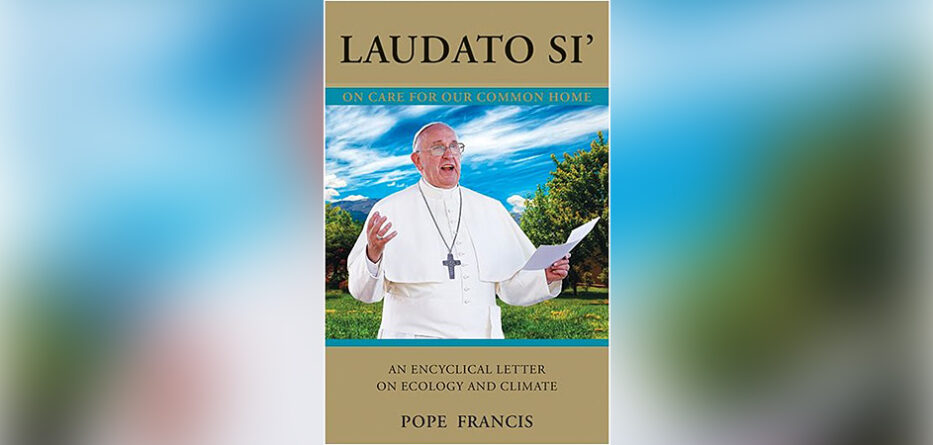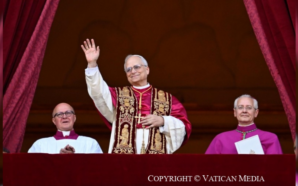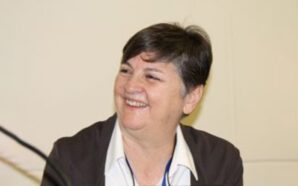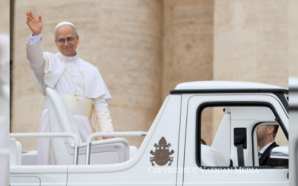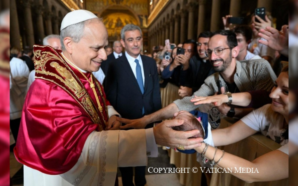Francis is gone, long live Laudato si’. Ten years after the May 24, 2015 signing and publication of the first papal document dedicated entirely to the ecological crisis, several public figures reflect on how the encyclical affected them—and the impact they believe it has had.
What was meant to be an anniversary has become a tribute. Nearly 10 years ago, on May 24, 2015, Pope Francis signed Laudato Si’ (“Praise Be”), the first papal encyclical devoted entirely to the ecological crisis—a landmark document that offered both Christians and the world a spiritual and scientific call to safeguard our common home.
Brilliantly structured, the encyclical cuts to the root of today’s intertwined crises—ecological, economic, social and spiritual. “Everything is connected,” Francis wrote, grounding his moral vision in scientific truth more explicitly than any pope—or head of state—had done before. “Pope Francis articulated the crisis far better than we ever could,” paleoclimatologist Valérie Masson-Delmotte, a member of La Croix’s environmental expert network, told us recently.
Yes, one could lament that Laudato Si’ and its follow-up, Laudate Deum (“Praise God”), haven’t revolutionized the world or fully ignited the ecological conversion they called for. Worse still, climate denial has now crept into ballot boxes. But these texts remain vital—sources of motivation, roadmaps for change, and evidence that realism and hope can go hand in hand.
To mark the anniversary, La Croix invited several public figures to reflect on how Laudato Si’ has challenged, inspired or affirmed them. They focused on the encyclical’s rich spiritual legacy, and from June 10 to 20 online and in print. Francis is gone, but Laudato Si’ lives on.
“The most comprehensive ecological text ever written by a head of state”
Cédric Villani, Fields Medal-winning mathematician and member of the Pontifical Academy of Sciences since 2013
“When I first read Laudato Si’, I was struck by how lucidly it synthesized our global situation. It remains, by far, the most complete ecological document ever written by a head of state. Pope Francis offers a scientifically rigorous analysis of our planet’s condition, leaving no major issue unaddressed.
It’s rare for a text of this stature to be so balanced. It doesn’t just talk about global warming—it also addresses pollution, water scarcity, biodiversity, social inequality, and the destructive effects of lobbying. What makes it powerful is that it combines personal responsibility with the need for stronger international agreements.
Maybe it’s because I once spent two weeks living among the Kogi people in Colombia’s Sierra Nevada. Paragraph 146, which urges special attention to Indigenous communities—those who “preserve their territories best”—resonated deeply with me.
As a scientist and an agnostic, I see Laudato Si’ as a model of spiritual engagement grounded in science and reality. It begins with a scientific description of the world and then brings in faith as a source of love and strength to care for our common home. That commitment to listening to science is, to me, one of Pope Francis’ defining traits.
In the face of so much global blindness, Laudato Si’ gave me hope. I even drew on it during my time as a French MP from 2017 to 2022. With its sequel, Laudate Deum, and the social complement Fratelli Tutti, Pope Francis placed the church at the forefront of intellectual leadership on these critical issues.”
“What a shame humanity didn’t heed this warning”
Corinne Lepage, attorney and former French environment minister, working on a Universal Declaration of Human Responsibilities at the time of Laudato Si’’s publication
“When Laudato Si’ was released in 2015, it came just months before the Paris Climate Agreement. At the time, the mood was very different from today. After the failure of COP15 in Copenhagen in 2009, the international community seemed to finally grasp the urgency of the environmental crisis. President François Hollande even asked me to draft a Universal Declaration of Human Responsibilities to help secure a livable planet for all.
Laudato Si’ was courageous and radical. It didn’t just bemoan environmental degradation—it asked deep questions about technology, transhumanism, and the myth of ‘infinite growth.’ It challenged the notion of humanity as a creator in place of the Creator.
In that sense, the encyclical aligns closely with the principles of deep ecology, a philosophy that questions humanity’s domination of the natural world. While it doesn’t go so far as to argue for equality between all species, Francis reminds us of our duty to care for all life, animal and plant. He rejects interpretations of Genesis that place humans as owners of the Earth. Instead, he calls us to be guardians and stewards.
That responsibility underpins the legal push by some of us for the rights of future generations to inherit a livable world. Francis called us to live ‘as brothers and sisters, without harming anyone.’
The science was already well-known. The solutions aren’t particularly novel. But the strength of Laudato Si’ lies in its clarity and cohesion. It calls for a true ecological conversion—one that embraces both ecosystems and human dignity. What a tragedy that humanity failed to take this warning seriously. We are now paying the price.”
“I was pleasantly surprised when I read Laudato Si’”
Laurent Berger, former head of the CFDT union, now director at Crédit Mutuel–Alliance Fédérale’s Institute for the Environment and Solidarity
“I grew up in a Catholic environment steeped in social teaching. During my university studies in history, I delved into Church texts while writing my thesis on Bishop Villepelet’s episcopate in Nantes (1936–1966). Still, I haven’t always agreed with the church’s positions. So I was genuinely and pleasantly surprised by Laudato Si’.
Pope Francis connected the twin ticking time bombs of climate change and social inequality. He used universal language to address contemporary challenges and condemned our societies’ rampant consumerism in no uncertain terms. He held the international community—especially wealthy nations—to account.
At a time when many governments are rolling back environmental policies, the encyclical remains more relevant than ever. Its message aligns with how the CFDT viewed the world and with my current work at Crédit Mutuel–Alliance Fédérale’s environmental and solidarity institute, which devotes 15% of its profits to projects that fight climate change and inequality.
I wouldn’t say it was a guiding text in my roles—more like a solid foundation, much like the work of other thinkers and intellectuals I drew on. In 2019, we launched the “Living Well Pact” with several partners, based on the same idea that environmental and social issues are deeply intertwined—an idea that now shapes many organizations and businesses.
Fratelli Tutti, released in 2020, also made an impression on me. Francis critiques globalization, shifts the focus from ‘I’ to ‘we,’ and calls for fraternity and the protection of the vulnerable—values I’ve championed throughout my career. In my view, the church must remain open to the world’s challenges. The election of Pope Leo XIV, following in the footsteps of Leo XIII, father of Catholic social teaching, gives me hope.”
“Francis’ vision of integral ecology includes everything”
Bishop Gerardo Alminaza, San Carlos, Philippines; advocate for fossil fuel divestment and environmental justice
“Pope Francis’ visit to the Philippines in January 2015, followed by Laudato Si’ a few months later, was providential. His message came at a crucial time for us—we are among the countries most vulnerable to the climate crisis, facing 20 to 26 typhoons a year and erratic weather. Temperatures regularly climb above 42°C, even reaching 50°C in some areas. Add floods and volcanic eruptions to the mix… It’s like nature is trying to teach us a lesson we refuse to learn.
Laudato Si’ helped broaden my view. Before, I focused only on how the crisis affects humans. Now I see how it impacts the whole ecosystem. Francis’ concept of “integral ecology” encompasses everything—human rights, dignity, family life, the economy, justice and peace. It reminds us that everything is connected, calling us to change how we relate to others and the world.
It’s like a spiderweb—pull one thread and the whole thing moves. What happens in the Philippines affects France, the Mediterranean, Africa. We must expand our hearts and minds. Wherever I go, I feel at home. We may differ in color, language or culture, but we all belong to the same common home.
And that must translate into action. On the island of Negros, where I’ve served as bishop since 2013, women began fighting coal projects over 30 years ago. Thanks to their efforts, we persuaded both provincial governors to commit to going coal-free and embracing renewables. We’ve become a global “hope spot”—a play on the term “hot spot.” We want to show it’s possible to break free from dirty energy.
Now I hope our new pope, Leo XIV—who presents himself as a bridge between the Global North and South—will continue Francis’ ecological legacy and guide us through the industrial revolution of today, in the age of digital technology and artificial intelligence.
Reproduced with permission from La Croix International.




